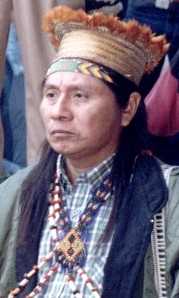U'wa people
| Total population | |
|---|---|
| 7-8,000 | |
| Regions with significant populations | |
| Arauca, Boyacá, Casanare, Santander and Northern Santander | |
| Languages | |
| Uw Cuwa, Spanish | |
| Religion | |
| Animist | |
| Related ethnic groups | |
| Chibchan peoples |
The U'wa people are an indigenous people living in the cloud forests of northeastern Colombia. Historically, the U'wa numbered as many as 20,000, scattered over a homeland that extended across the Venezuela-Colombia border. Some 7-8,000 U'wa are alive today.
The U'wa are known to neighboring indigenous peoples as "the thinking people" or "the people who speak well". They were formerly called Tunebo, but today prefer to be known as U'wa, meaning "people".
Struggle to prevent oil drilling
They gained international visibility in a 14-year long struggle to prevent oil drilling on their land, which secured the withdrawal of Royal Dutch Shell and Occidental Petroleum (Oxy), and continues as Ecopetrol and Repsol YPF seek to drill on their land. Their representative to the outside world in this struggle, Berito Kuwaru'wa, won the Goldman Environmental Prize in 1998.[1] The conflict came to a head as Oxy prepared to drill at the Gibraltar 1 test site. The U'wa, who had previously threatened to commit mass suicide if the oil extraction project went forward,[1] constructed a small village on the site of the drillsite. They also set up numerous roadblocks and a coordinated (together with neighboring campesinos and the Guahibo people) a regional social strike that paralyzed the surrounding area. Although the Colombian military dislodged the protesters from the site, no commercially viable deposits were found. The U'wa are now in a new dispute with Ecopetrol, which is seeking to prospect for oil on their lands.[2]
Geography
The U'wa people live in northeast Colombia, in the departments of Arauca, Boyacá, Casanare, Santander and Northern Santander. Historically, they have also lived in what is now Venezuela.
Territory
The U'wa ancestral homeland, known as Kajka-Ika or Kera Chikara, lies in the Sierra Nevada del Cocuy Mountains and covers more than 3 million acres (12,000 km²). The area includes the headwaters of the Orinoco River. Historically, substantial portions of their homeland have been protected from any human access.
The U'wa have been engaged in a major project of land recovery, expanding their recognized territory from 247,700 to 543,000 acre (1000 to 2200 km²) Unified Reserve (Resguardo Unido) in 1999.The U'wa live near the amazon river which flows through all of South America.
Culture
The U'wa speak a language of the Chibchan family called Uw Cuwa ("people's tongue"). They have no written tradition and have passed down their knowledge and customs primarily through song.
Their religious tradition includes an obligation to gather in the summer months and "sing the world into being" as well as to maintain equilibrium between the layers of the world: earth, water, oil, mountains, and sky. Their identification of petroleum, which they call Ruiria, with the blood of Mother Earth, stiffened their resolve in their conflict with oil corporations in the 1990s.[3]
The U'wa consider non-U'wa to be impure, and place high importance on purification rituals, which makes interaction with outsiders difficult.
Institutions

The U'wa organize their political life in a collection of institutions known to the outside world as the U'wa Traditional Authorities. This body is made up of Werjayás (wise elders) and Karekas (medicine people) from each of the U'wa clans. The system of Cabildos mandated by the Colombian state includes and upper and lower council or Cabildo Mayor and Cabildo Menor, as well as the positions of President, Vice President, Secretary, Treasurer, Public Prosecutor and Speaker. Berito KuwarU'wa has served as president in recent years.
The U'wa have affiliated with the Guahibo people in the Association of Cabildos and Traditional Indigenous Authorities of the Department of Arauca (ASCATIDAR), officially founded in June 2003 to promote the local autonomy of the department's Indian peoples. The Association's president is Dario Tulivila, a Guahibo leader.
Clans
The U'wa were grouped into eight clans from time immemorial to the 20th century. Three clans survived their dramatic population loss in the last hundred years and structure their communal life today: Kubaruwa (Cobaria), Tagrinuwa (Tegria) and Kaibaká (Bokota), each of which includes multiple communities. The U'wa population includes some 822 families.[4]
References
- ↑ 1.0 1.1 Goldman Environmental Prize (South & Central America 1998): "Berito Kuwaru'wa" (Retrieved on January 6, 2008)
- ↑ Ángela Uribe, Petróleo, economía y cultura: El caso U'wa, Bogotá: Universidad del Rosario / Siglo del Hombre Editores, 2005.
- ↑ Vidal, John (October 12, 1997). "A tribe's suicide pact". Manchester Guardian Weekly. p. 8.
- ↑ UNESCO Centre of Catalonia, U'wa Dossier.
External links
- Rainforest Action Network background
- (Spanish) Luis Angel Arango Library; Mythology and structure among the U'wa
- U'wa Dossier